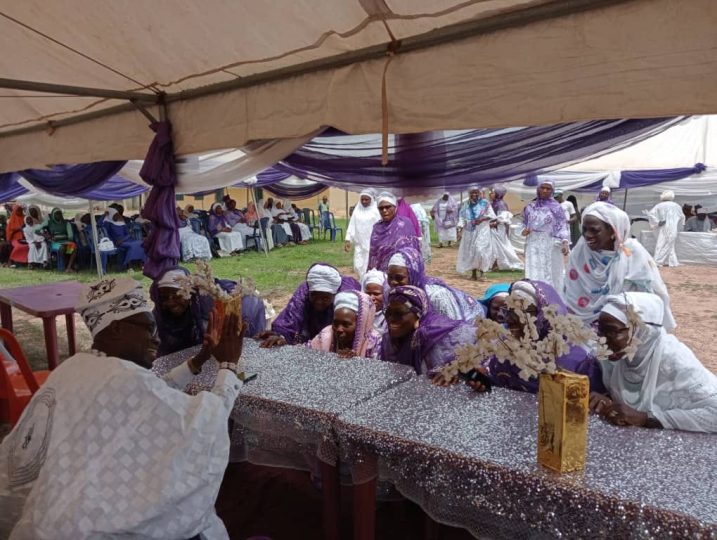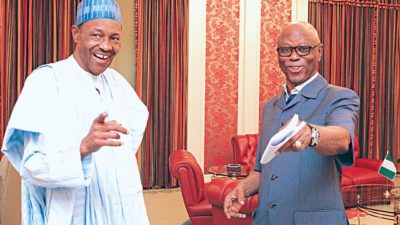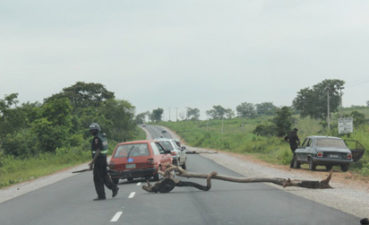*Social media reactions
By BASHIR ADEFAKA
The article by Osun monarch and Akire-Ile of Ikire Ile, in Ola-Oluwa Local Government Area, Oba AbdulAzeez Olatunbosun Adebamiji, published in The DEFENDER on Friday June 16, 2023 has attracted reactions mostly positive from Nigerians.
The piece titled, “President Tinubu and the exigency of fuel subsidy removal”, highlighted vital areas that connect his new policies of fuel subsidy removal and multiple foreign exchange rates unification among others as an indication of achievable Renewed Hope of his electioneering campaign.
The Polytechnic lecturer-turned monarch said, “While some see only the timing as inappropriate, others are of the opinion that the removal is uncalled for. The purpose of this little contribution to the debate is to give an indepth explanation of the concept in a clear language for the understanding of the common man.”
Oba Adebamiji said, “Those who are against the removal of fuel subsidy hinged their argument on the unavoidable hike in pump price of petroleum and its negative effect on the cost of living.
“The bandwagon effect on cost of transportation as well as the exorbitant prices of goods and services are the realities of life which no Nigerian can shy away from.
“However, those who are in support of the removal are aware of the fraudulent act involved in the administration of the subsidy,” he said and then went on to explain applying his academic experience into the conversation.
“What is Fuel Subsidy?” He asked and is quick to define it: “In a simple language, to subsidize fuel is to sell the product below the cost of production that is borne by someone else. Government shouldered this burden to enable fuel to be sold at a lower price purposely to ease the impact of higher price on the masses.
“Therefore, fuel subsidy can be described as a government effort in paying for the difference between the pump price of fuel at the petrol station and the actual cost of production/importation of the product.
“The noble idea of subsidy dated back to the early 1970s, and it actually became institutionalized via the promulgation of the Price Control Act of 1977. This made it illegal for public goods including petroleum to be sold above the regulated price,” he traced the history, legal framework of fuel subsidy and implication of sabotaging the masses’ benefit.
Explaining why the removal becomes necessary he said, “However, the Nigerian factor has turned the intention of government to a mirage due to poor administration which paved the way for corruption. The Nigerian National Petroleum Company (NNPC) reported that in the year 2022, daily consumption of premium motor spirit, otherwise known as petroleum rose to 103 million litres out of which about 58 million were smuggled out to neighbouring countries due to the porosity of the Nigerian borders.
“Invariably, this simply means that the government of Nigeria, at the detriment of the economy, has been subsidizing fuel being used in those other countries.”
To this end, “Removal of the fuel subsidy technically is about full deregulation of the downstream sector to pave way for vibrant competition by other interested investors. It simply means the government is not paying for the difference between pump price and the actual cost of importing fuel anymore. By implication, fuel will have to be sold on the basis of the prevailing market prices and consideration of the actual cost of production or importation.”
He provided the rationale for the fuel subsidy removal to include the fact that subsidy being paid over the years had been a scam and that the fraud made it possible for few individuals to feed fat on the huge government borrowings to finance subsidy, adding that subsidy removal will reduce government reliance on loan to finance its budget and the effects of huge deficit.
Part of the rationale, according to him, is that the bunkering that thrived in Nigeria as a result of quick money realizable from the sales of petroleum products illegally gotten and the loss of which the government still paid for will have been removed.
Among other points he gave to justify his backing of the Tinubu’s policy of fuel subsidy removal was that payment of subsidy had encouraged smuggling of petroleum products along Nigerian borders with the neighbouring countries thus fetching more money to the saboteurs rather than to the government and that all of those vices will no long be.
Oba AbdulAzeez Adebamiji wondered that “Despite being the largest Africa’s producer of oil and gas, Nigeria still relies heavily on importation to meet its gasoline needs. There are four major oil refineries in Nigeria, two in Port Harcourt, one in Warri and one in Kaduna, with a combined production capacity of 445,000 barrel per day, but unfortunately none is functioning!
“They have been dilapidated and shut down due to corruption and mismanagement which propelled oil theft, pipeline vandalism and structural neglect. It is very unfortunate that Nigerian leaders since 1999 when the current political dispensation started have not been able to rehabilitate our refineries and never took drastic measures to sanitize the NNPC and eradicate the corrupt practices of those involved, including marketers.”
He, however, became optimistic of hope for a better Nigeria as he said, despite the immediate effect of untold hardship that trail the removal, there definitely is light at the end of the tunnel, while tasking the government on palliative measures to cushion the effects of the policy on the Nigerian masses.
“However, Nigerians should be optimistic that the nation is in safe hands, and that the hardship will be short-lived. President Tinubu will use his wide range of experience to turn things around for good. Once all the leakages are blocked, it will free resources for investment in other critical sectors such as security, education, healthcare and infrastructure.
“To cushion the hardship brought about by the removal of fuel subsidy, government needs to provide palliatives for the citizenry. These may include cash transfer program which will target the poor to gain the trust of its citizens, provision of mass transportation systems, reducing the number of days civil servants appear physically in the office per week to three days while they work at home virtually for two days.
“Effective mass transportation will also reduce the cost of daily transport of children to school. However, as good as this may look, it is extremely difficult to cover all vulnerable households in the society.
In addition, reducing the percentage of excise taxes payable on specific goods or services at the time they are purchased is another possible way to alleviate the suffering of the people occasioned by the hike in pump price of Premium Motor Spirit (PMS).
“Hopefully, the Dangote Petroleum Refinery Company which was launched sometimes in May 2023, when fully operational, will reduce Nigeria’s dependence on importation of petrol for domestic use. Information from a reliable source revealed that the first product from the refinery is expected to hit the market by the end of July 2023.
“The refinery has the potentials to address the country’s energy supply crisis giving its capacity of 650,000 barrels a day. Let’s give Mr. President the benefit of the doubt. Rehabilitation of one or two of the refineries is achievable before he clocks a year in office.
“Another indication of Mr President’s readiness to get things right for this country is his fight against corruption. The removal, arrest and revelations surrounding the former Governor of the Central Bank of Nigeria Mr Emefiele speaks volumes. A few other captains have been suspended and I believe a few more would likely be affected soon.”
Social media reactions
Idris Ahmad (Port Harcourt, Rivers) said: “PMS subsidy removal was already a concluded transaction as it’s not in the 2023 budget. It’s carried on until end of May because of likely effect it would have had on APC and candidates in the last elections.
Moyosore Oyetunji (Iwo, Osun State) gave a thump up saying, “That’s my monarch.”
As for Lukman Isa (Zaria, Kaduna), “They should make palliative for citizens as soon as possible because transportation is very expensive.”
Lawal Kehind (Agege, Lagos) queried with a sweeping blame on former President Muhammadu Buhari: “What type of palliative will be used to repay the electorates won’t such money find his way to individuals pockets like the buhari palliative which only goes to some regions while we in the West were left to suffer during the covid 19 pandemic well we are watching how the scheme will do the needful for poor Nigerians.”
But he was immediately replied by Johnny Oghenerhoro, who said, “Lawal Kehinde on the contrary. The Buhari palliative was given to all the 36 States and FCT through the Governors and Minister of FCT. Many States, a good example is Delta State, didn’t give even a cup of rice to anyone apart from few of his Party Chieftains. So it wasn’t Buhari, but the Governors who are always our problems.”
Whereas Lawal Kehinde partly agreed with Johnny on why Buhari should not be blamed but the state governors who siphoned the money for failed palliatives of the past especially during the Coronavirus pandemic period, he insisted that Buhari’s inability punish the governors for their economic crimes against the poor was his undoing.
Lawal Kehinde’s words: “Johnny Oghenerhoro yes that’s the problem which punishment was meted out to those governor’s while in office our law is not working look at the humatarian minister Mrs farouk who collected 500 billions as palliative and we coundnt see one cup of rice in Lagos State it’s disheartening to see wucked leaders ruling us.”
From Lokoja, Kogi State capital, Engr. Yusuf Ajeka contributed to the conversation praising the Akire-Ile’s article as “An insightful and Rich elucidation on the vexed issue of OILY MESS by Nigerian Presidency and NNPC.”
Sekynat Ajoke wrote: “They are talking of a compressed gas dat is an alternative to petrol dat NNPC will roll it out before ending of June. It will be sold N100, N110. It’s to cushion d effect of d high cost of price. I pray they get it right, sharing money will not get to d right hands. I hope the defender newspaper equally believe in wat they shared. May Nigeria be great again, may PBAT succeed!”




